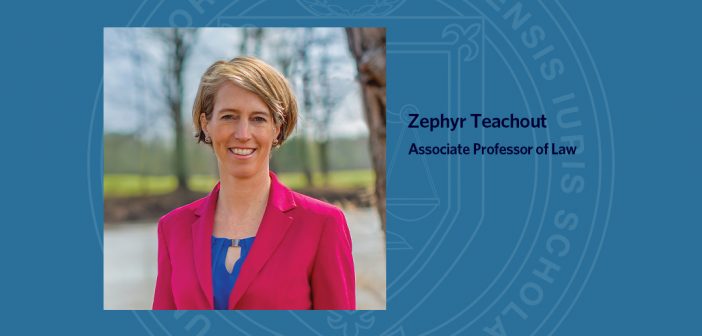Professor Zephyr Teachout testified on Oct. 1 before the House Subcommittee on Antitrust, Commercial, and Administrative Law at a hearing titled “Proposals to Strengthen the Antitrust Laws and Restore Competition Online.” This was the final hearing in a series of seven hearings exploring whether the tech giants Amazon, Apple, Facebook, and Google are operating as illegal monopolies. Teachout is the author of Break ‘Em Up: Recovering Our Freedom from Big Ag, Big Tech, and Big Money, which delves into how these companies and others are evolving from monopolists into political entities.
Teachout submitted written testimony to the committee in April and was later invited to testify in person. Although she could have testified remotely, Teachout said she didn’t want to miss the opportunity to be there in person. We spoke with her about her testimony and her views on the growing power of corporations in American society.
How did you get involved with testifying about this huge issue?
I’ve written on the need for structural separations and a dramatic change in U.S. antitrust laws, in addition to the incredible urgency that needs to be taken by Congress in reasserting itself as the key institution and taking responsibility for anti-monopoly laws. I was honored to testify because it was one of the most extraordinary Congressional committees I’ve ever seen. It’s a model for what we should see in Congress—using its unquestioned congressional power to investigate in order to make policy.
What’s at stake and why is it important?
One issue at stake is the growing power of large corporations—especially, but not limited to big tech—who play an outsized role in governing us. Monopolies are a democratic threat because they’re a rival form of private government. The other issue is the vacuum Congress has created for itself and has lived in for so long. It’s lost the muscle for subpoenas, investigations, and pointed questions. There are few great moments in hearings that you can see on YouTube, but Rep. David Cicilline, chairman of the subcommittee on antitrust, commercial and administrative law, and his committee showed how those can be much more than moments. They highlight what an ongoing year-long investigation can entail.
As I testified, we have an economy that’s leading to gross levels of inequality, disempowerment and poor treatment of workers, and one that is destroying our small businesses. It’s harder to start a business now than it was in 1975 and it’s harder to start one in the United States than in Europe. Congress has sort of treated this as “not my job,” which is a huge problem. Congress hasn’t used the full scope of its power, especially when dealing with corporate abuses, and needs to be involved in addressing excessive monopolization. In human terms, there are unbelievable levels of depression, suicide, drug use, and anxiety of rational paranoia, where people increasingly feel out of control. It doesn’t have to be this way. I think there needs to be a focus on redistribution when trying to create taxation systems that solve some of the problems that have been created.
What were some of your key policy recommendations?
I wanted to talk about structural separation during my testimony—even though I knew they probably wouldn’t push for it—because it’s so important. Amazon has no business owning its warehouses or competing on its own platform, just like Google has no business owning YouTube. That conflict of interest at the heart of our economy is allowing them to have outsized political power and is squeezing out small business owners. We need to have a thriving digital ad market, not a duopoly governed by Facebook and Google. Two ways to do that are by breaking up the duopoly and not allowing platforms, who also own other companies, to rely on those platforms.
What else can this investigation teach us?
It’s an amazing example of highlighting the impacts of both academic and student work. The intellectual framing from Lina Khan was everywhere in the hearing and in the report. She was a student at Yale Law School when she wrote the article, “Amazon’s Antitrust Paradox,” in 2017, and now she’s an associate professor of law at Columbia Law School. It was an incredible testament that showed how impactful scholarship can be, how academic writing can quite literally change the world.



